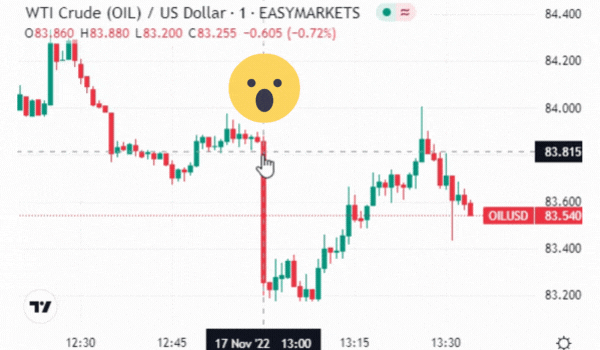The short-lived boost enjoyed by the oil markets, thanks to the significant crude draw announced by the EIA, US Energy Information Administration, this week lost its spark on Thursday as the gloomy economic news grabbed the headlines - once again.
Jeremy Hunt, the Chancellor of Exchequer of the UK, for instance, did not mince his words when he depicted the state of the economy in the UK in his Autumn Statement: he admitted that the UK was already in recession and it could shrink even further; in response, there was a significant drop in the price of oil, as shown above in the animation.
It is not just the UK that is caught up in economic headwinds; in the US, the technology sector has been in the news for the past couple of weeks, reflecting the precarious situation faced by it, something that had already trigged off the unprecedented mass layoffs.
The war in Ukraine and political discords involving key global players, meanwhile, do not create a conducive atmosphere to stem the tide of global concerns that take their toll on markets of every kind. On the contrary, they have made things taking a turn for the worse, especially in the energy sector that has become a major factor behind the global inflation, regardless of the regions of the planet.
Since, time and again, the policymakers failed to get a grip with the crises that stem from the spiraling inflation, markets brace themselves for more bad news on many fronts in the near future.
In this context, it is inconceivable that the demand for oil will be back to where the oil producers want it to be - any time soon. The OPEC+ admitted that it's the case and defends the rationale behind recent production cuts on the grounds of this development that almost brought the cartel in the crosshairs of the US retaliation.
The fact that the price of crude oil could not be sustained by the crude draw in the US - apart from a short-lived spike - shows the partial relevance of the latter in determining the price of crude oil in recent months; its role appeared to be eclipsed by the price of LNG, liquified natural gas, that more or less can make an impact.
On political front, meanwhile, having lost the control of the House of Representatives to the rival Republican Party, the Biden administration may find it difficult to carry on business as usual in the next two years.
Analysts are keenly watching the potential moves with regard to energy sector, as the administration tries to stick to its manifesto, despite the obvious economic problems faced by a large section of the population by exponential rise in energy costs.
With the control of the Senate hanging in the balance, the Democrats may face numerous challenges during what is left of President Biden's first term, despite the victories of the Republican Party being far below the expected level.
In this context, it is highly unlikely that the price of oil reaching $100 a barrel in the foreseeable future. The only factor that appears to be supporting the current price level is the relatively high price of natural gas.
Since Europe is enjoying relatively warm temperatures in the fall, the price of LNG has not skyrocketed so far as feared that in turn keeps the price of the commodity low despite the obvious supply woes.
Moreover, the countries in the EU have managed to replenish the gas stocks against the odd during the latter part of summer, turning to various alternative sources while shunning Russia. In addition, the repeated appeals by the the European governments to cut down on use of gas and electricity seem to have an impact on the consumption too.
All in all, the price of LNG has become a major factor, if not the most important, in determining the price of crude oil. Since a forecast of winter weather beyond five weeks is no exact science, its price in the next few weeks is anybody's guess,though.







